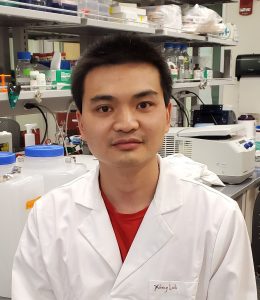As posted in UConn Today August 1, 2023 by Anna Zarra Aldrich ’20 (CLAS), Office of the Vice President for Research, Yulan Xiong, assistant professor of neuroscience at UConn Health, and her team have discovered that a regulator compound holds the potential to treat Parkinson’s Disease.
Scientists have known that, in most familial cases, Parkinson’s Disease is caused by a genetic mutation in a gene called LRRK2. With Parkinson’s disease, mutation to LRRK2 does not cause the protein it codes for, daradarin, to become deformed. Instead, the body begins producing too much of the protein. Until now, scientists did not know how to control this protein expression because they didn’t understand the mechanisms underlying it.
The Xiong lab has solved this mystery with their novel study identifying an LRRK2 regulator, an enzyme called ATIC, and a potential pharmaceutical treatment AICAr. Xiong lab recently published these findings in The EMBO Journal.
The first author for this study is a PhD student, Qinfang Liu, in the neuroscience graduate program at UConn health. Other researchers who contributed to this study are Dong Zhu, Shifan Chen at UConn Health, and Naren Li, Liang Hu, and Jianzhong Yu at UConn Storrs. This work was supported by funding from the National Institutes of Health and the Parkinson’s Foundation.

